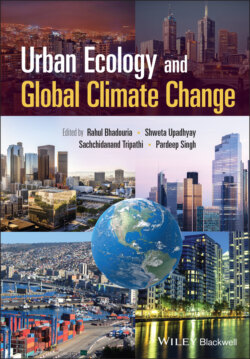Читать книгу Urban Ecology and Global Climate Change - Группа авторов - Страница 48
2.5 Climate Change as a Risk Factor to Increase the Occurrence of Cardiometabolic Syndrome 2.5.1 Changing Climate Is One of the World's Principal Concerns
ОглавлениеWhen the average weather, extreme weather, and its distribution across the globe see a statistically significant shift, it is termed as climate change (Wu et al. 2016). The main influencing causes are changes in one or more factors that decide the status of weather. These factors include temperature, precipitation, wind, and sunshine (Kim and Grafakos 2019). Climate change is our biggest concern nowadays as the human race, specifically impacted by non‐negligible human physical activities. According to the European Environment Agency (EEA), the global average surface temperature has increased by 0.74 °C in the twentieth century, the global sea level has been rising 1.8 mm per year since 1961, and the Arctic sea ice has been shrinking by 2.7% per decade. Moreover, mountain glaciers are contracting, ocean water is becoming more acidic, and extreme weather events occur more often (Weng et al. 2014; Yang et al. 2013). This changing climate has created a great deal of concern for people prone to heart disease as the unpredictable weather has adverse effects on our physiology and blood flow rate such as oxidative stress, low‐grade inflammation, vascular dysfunction, etc., which creates stress on the heart and increases the risk of cardiometabolic disease especially in aged people and people with a history in diseases (Münzel et al. 2017c).
